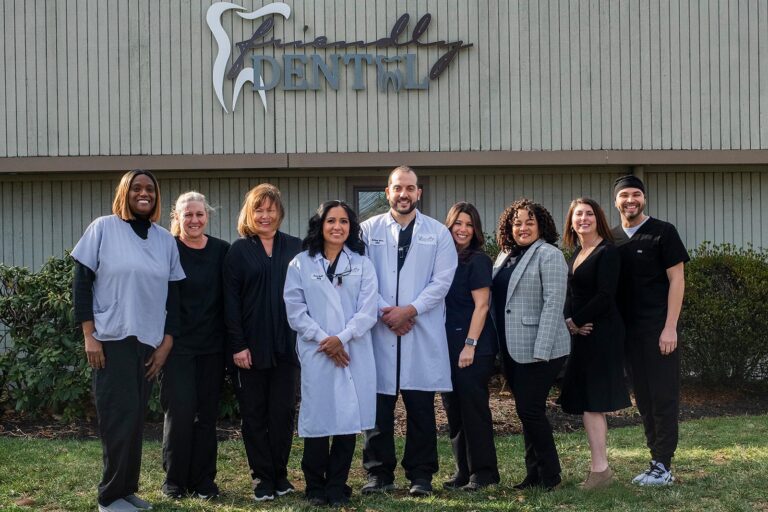Symptoms can include gums that bleed, swollen/red gums, gums that have receded away from the teeth, persistent bad breath or bad taste, pus between your teeth and gums, permanent teeth that are loose or separating, any change in the way your teeth fit together when you bite, any change in the fit of partial dentures.
Gum Disease Treatment
Gum disease can sneak up on you, but early treatment makes a big difference. At Friendly Dental, we help stop infection and keep your gums healthy.
-
Cost
The cost of gum disease treatment depends on the stage and type of care needed. We’ll review your options and create a plan that fits your budget.
Office Fees -
Procedure Duration
Treatment time varies. Advanced gum disease may require several visits over a few months.
Schedule Online -
Comfort Measures
We use local anesthesia and gentle techniques to keep you comfortable. Most patients report only mild soreness after treatment.
Sedation Dentistry
Gum Disease Treatment in Aberdeen, NJ
Periodontal disease, commonly known as gum disease, is the most common adult dental affliction. About 75% of the population experiences some gum disease, and it’s the number one cause of tooth loss in adults.
To diagnose gum disease, your dentist measures the space between your tooth and gums. They consider the texture and shape of your gums and any movement. It’s also vital to examine the levels, shape, and density of the bone around your teeth on digital X-rays. Drawing together numerous findings gives a clear picture of your gum condition. If you’ve been diagnosed with gum disease, there are various treatment options depending on the severity of the problem. We prefer to start with the least invasive options, which are non-surgical. However, in more serious cases, surgery may be necessary.
Routine dental exams, professional cleanings, and good oral hygiene practices at home are essential to detecting and strategically managing periodontitis.
01.
Process of Gum Disease Treatment
Soft Tissue Management has been utilized at Friendly Dental since the 1980s to conservatively treat most periodontal disease without surgery. This is mostly done with scaling and root planing combined with lasers and/or antibiotics.
In this procedure, an ultrasonic cleaning device and specialized hand instruments are used to remove plaque and tartar from your teeth where regular cleaning devices can’t reach: under the gum line, on the tooth, and around the root. Then, the rough surface of the tooth and the root are smoothed out. This provides a healthy, clean surface that makes it easier for the gum tissue to reattach to the tooth.
If the inflammation has advanced with measurable bone loss, we often suggest numbing your gums for your comfort during the deeper cleaning process. One area at a time undergoes meticulous cleaning above and below the gum line, usually over several visits. The infected collar or pocket around each tooth, including the mineralized tartar, must be carefully cleaned by hand and with ultrasonic instruments. Polishing of the teeth to establish glassy surfaces that help repel stain and plaque accumulation usually finishes this initial therapy.
02.
What Are the Next Steps?
As with any dental procedure, after-care is vital. In order to keep your teeth in good shape and resist future occurrences of gum disease, you must brush and floss daily, eat a healthy diet, avoid tobacco use, and have routine dental checkups, usually every three to four months. Within just a few hours of a careful cleaning, the bacteria begin to repopulate and adhere to the teeth. Thus, plaque left undisturbed will start to harden and mineralize within 24 hours, making it essential to maintain your oral health.
Dr. Gomez and Dr. Homsi may suggest a medicated rinse, an electric toothbrush, a Waterpik, or other specific strategies to help you with your ongoing efforts. Remember, gum disease can be controlled but not cured. Consistent daily efforts are required to control the disease.
FAQ
-
What are common signs of gum disease?
-
How does periodontal treatment improve oral health?
Untreated gum disease leads to abscesses and generalized tooth loss in many advanced cases. That’s why it’s essential to discuss gum disease and periodontal therapy with your dentist. Treatment removes plaque and bacteria below the gums, allowing them to heal, reducing infection, and preventing tooth loss.
-
Can gum disease affect overall health?
Current research continues to establish clear links between bacterial disease in your mouth and ailments in other parts of the body. Studies show a link between oral bacteria and conditions such as heart disease, diabetes, hypertension, stroke, arthritis, Alzheimer’s, and certain types of cancers. The integration of oral and general health has never been better understood than it is currently.

